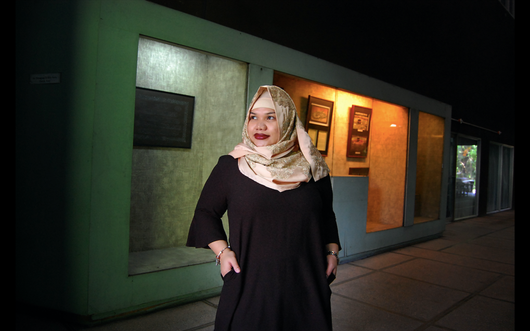Defending the Rights of Muslim Filipino Women: Shari’ah bar passer Amanah Lao is ready to fight for Muslim Filipinas’ rights in court.

This is a challenge that Amanah Busran Lao will be facing in her work.
Having passed the 2018 Special Bar Examinations for the Shari’ah Courts held in January, Amanah is now a Shari’ah counselor-at-law. She joins the ranks of about 1,000 who have passed the exams since 1983, when they were first given.
Shari’ah law is a set of principles that make up the legal system of Islam. It covers many aspects of a Muslim’s life such as marriage and family life; business and finance; and crime and punishment.
In the Philippines, elements of Shari’ah law are embodied in the Code of Muslim Personal Laws (CMPL), or Presidential Decree No. 1083, which outlines laws on marriage and divorce, family relations, and other personal laws. The CMPL was enacted in 1977 but enforced only in 1985.
Amanah is an Australia Awards alumna who earned her Master of Human Rights Law and Policy at the University of New South Wales in 2012. She participated in a review of the CMPL by the non-governmental organisation Nisa Ul-Haqq Fi Bangsamoro (Women for Truth and Justice in the Bangsamoro) for her Re-Entry Action Plan (REAP). The REAP outlines how scholars will use their Australian education to contribute in a specific way in their workplace, community, or chosen field when they return to the Philippines.
“The CMPL was created more than 40 years ago, and was never amended; there are provisions that are out of date and no longer acceptable,” she said. “I wanted to look at the Code from a human rights perspective, because human rights is my personal advocacy.”
After reviewing the CMPL, however, Amanah realised that if she wanted to continue working in the field, she would need knowledge of not only legislation, but also litigation.
“I realised that the law component was missing. Because how do you defend women’s rights, if there is a violation?” she stressed. “That’s what I want to focus on now.”
Aside from contributing to the CMPL, Amanah’s REAP also focused on the review of age provisions under the Muslim laws in the Philippines, and contributed to the design of the research Pluralist justice for women after violence: An experiment in building justice webs in the Philippines project. This research was a collaboration between Nisa Ul-Haqq Fi Bangsamoro and the Australian National University.
‘Human rights are international’
Amanah’s exposure to human rights work made her “hungry for more.” Her Australian education opened her eyes to the different aspects of human rights work and gave her a fresh take on issues.
“The environment in Australia helped expand my understanding of human rights. It made me realise that human rights are international—made up of efforts from all countries. That’s how it should be viewed,” Amanah said.
For Amanah, Australia provided the right balance of study and recreation. She felt this balance was important when studying a difficult and complex issue like human rights that requires time and space to process.
“Human rights involves people’s stories,” Amanah explained. “There’s violence involved and these stories have to be handled sensitively. The emotional impact is scary. If you don’t take care of that, you lose trust,” she added.
‘It’s tough’
According to the 2015 Census of Population, Islam is the second largest religion in the Philippines. A little over six million —roughly six per cent of the Philippine population of 105 or so million —are Muslim.
“It’s tough to be a Muslim in the Philippines,” Amanah shared. “I say this based on my experience,” she added, citing the stigma attached to being Muslim in a predominantly Catholic country.
But it’s even tougher for Muslim Filipinas, she emphasised.
Like many other Filipinas, Muslim women are expected to take care of their children and be homemakers. In some ways, however, Muslim society tends to be even more patriarchal, Amanah said. Viewing the CMPL through the lens of women’s rights would make it more relevant and gender fair.
A particular concern for Amanah is the provision for early marriages. Article 16 of the CMPL says that “any Muslim female of the age of puberty” may contract marriage. It also states, “Marriage through a wali (guardian) by a minor below the prescribed ages shall be regarded as betrothal.”
“This means Muslim girls as early as 12 or even 9 years old conclude marriage through a guardian,” she said. “That’s too early.”
Being a woman and Muslim in the Philippines may be tough and the work ahead may be challenging. But Amanah is ready and knows that Muslim Filipino women have much to contribute to national development.
“We have a role,” she emphasised. “The question is, are we strong enough to take on the responsibility? If we think we are, that’s when we can identify which areas of development we want to work on.”
“We have other sources of law that I can use to support my defense—especially in cases of violence against women and children, or asking for support out of divorce,” she said. “I will really fight for women’s rights in the courts.”

